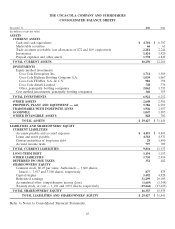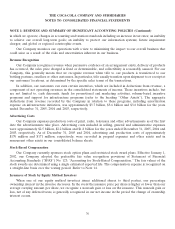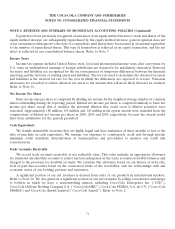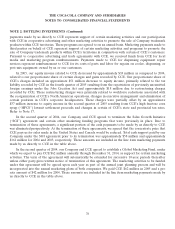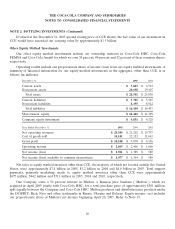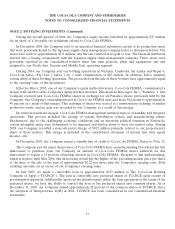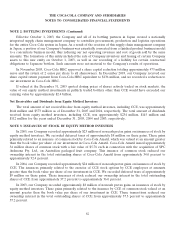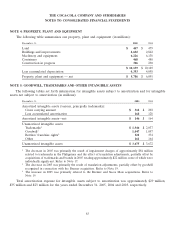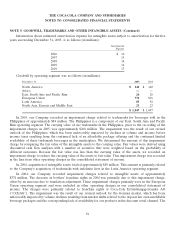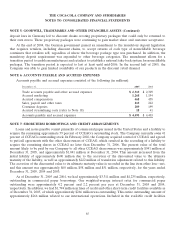Coca Cola 2005 Annual Report Download - page 77
Download and view the complete annual report
Please find page 77 of the 2005 Coca Cola annual report below. You can navigate through the pages in the report by either clicking on the pages listed below, or by using the keyword search tool below to find specific information within the annual report.THE COCA-COLA COMPANY AND SUBSIDIARIES
NOTES TO CONSOLIDATED FINANCIAL STATEMENTS
NOTE 1: BUSINESS AND SUMMARY OF SIGNIFICANT ACCOUNTING POLICIES (Continued)
consolidated financial statements. The Company will continue to apply the requirements of SFAS No. 153 on
any future nonmonetary exchange transactions.
In December 2004, the FASB issued SFAS No. 123 (revised 2004), ‘‘Share Based Payment’’ (‘‘SFAS
No. 123(R)’’). SFAS No. 123(R) supercedes APB Opinion No. 25, ‘‘Accounting for Stock Issued to Employees,’’
and amends SFAS No. 95, ‘‘Statement of Cash Flows.’’ Generally, the approach in SFAS No. 123(R) is similar to
the approach described in SFAS No. 123. In 2005, our Company used the Black-Scholes-Merton formula to
estimate the fair value of stock options granted to employees. Our Company adopted SFAS No. 123(R), using
the modified-prospective method, beginning January 1, 2006. Based on the terms of our plans, our Company did
not have a cumulative effect related to its plans. We do not expect the adoption of SFAS No. 123(R) to have a
material impact on our Company’s future stock-based compensation expense. Additionally, our equity method
investees are also required to adopt SFAS No. 123(R) no later than January 1, 2006. Our proportionate share of
the stock-based compensation expense resulting from the adoption of SFAS No. 123(R) by our equity method
investees will be recognized as a reduction to equity income. We do not believe the adoption of SFAS
No. 123(R) by our equity method investees will have a material impact on our consolidated financial statements.
During 2004, the FASB issued FASB Staff Position 106-2, ‘‘Accounting and Disclosure Requirements
Related to the Medicare Prescription Drug, Improvement and Modernization Act of 2003’’ (‘‘FSP 106-2’’). FSP
106-2 relates to the Medicare Prescription Drug, Improvement and Modernization Act of 2003 (the ‘‘Act’’). The
Act introduced a prescription drug benefit under Medicare known as Medicare Part D. The Act also established
a federal subsidy to sponsors of retiree health care plans that provide a benefit that is at least actuarially
equivalent to Medicare Part D. During the second quarter of 2004, our Company adopted the provisions of FSP
106-2 retroactive to January 1, 2004. The adoption of FSP 106-2 did not have a material impact on our
consolidated financial statements. Refer to Note 15.
In November 2004, the FASB issued SFAS No. 151, ‘‘Inventory Costs, an amendment of Accounting
Research Bulletin No. 43, Chapter 4.’’ SFAS No. 151 requires that abnormal amounts of idle facility expense,
freight, handling costs and wasted materials (spoilage) be recorded as current period charges and that the
allocation of fixed production overheads to inventory be based on the normal capacity of the production
facilities. The Company adopted SFAS No. 151 on January 1, 2006. The Company does not believe that the
adoption of SFAS No. 151 will have a material impact on our consolidated financial statements.
In October 2004, the American Jobs Creation Act of 2004 (the ‘‘Jobs Creation Act’’) was signed into law.
The Jobs Creation Act includes a temporary incentive for U.S. multinationals to repatriate foreign earnings at
an approximate 5.25 percent effective tax rate. Such repatriations must occur in either an enterprise’s last tax
year that began before the enactment date, or the first tax year that begins during the one-year period beginning
on the date of enactment.
Issued in December 2004, FASB Staff Position 109-2, ‘‘Accounting and Disclosure Guidance for the Foreign
Earnings Repatriation Provision within the American Jobs Creation Act of 2004’’ (‘‘FSP 109-2’’), indicated that
the lack of clarification of certain provisions within the Jobs Creation Act and the timing of the enactment
necessitated a practical exception to the SFAS No. 109, ‘‘Accounting for Income Taxes,’’ requirement to reflect in
the period of enactment the effect of a new tax law. Accordingly, enterprises were allowed time beyond 2004 to
evaluate the effect of the Jobs Creation Act on their plans for reinvestment or repatriation of foreign earnings
for purposes of applying SFAS No. 109. Accordingly, in 2005, the Company repatriated $6.1 billion of its
previously unremitted earnings and recorded an associated tax expense of approximately $315 million. Refer to
Note 16.
75


